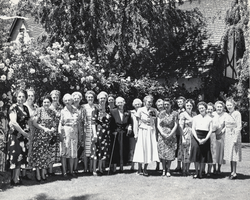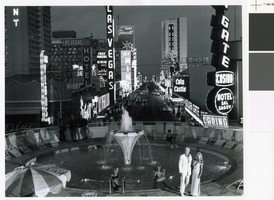Search the Special Collections and Archives Portal
Search Results

Transcript of interview with Alice Ward Boyer by Joanne Goodwin, June 26, 1996
Date
Archival Collection
Description
Alice Ward Boyer arrived in Las Vegas from Oklahoma in 1937. Her brother and former husband came earlier to escape the dustbowl depression and get settled. In the middle of the summer, just at dusk, she emerged from the train at Kingman, Arizona with her two small children to meet her family and drive through the darkness to her new home in Las Vegas. Although she missed the trees of the Plains, she soon became accustomed to her desert home. Her recollections revive the older Las Vegas when community life characterized the small town. At the heart of her story is the Mesquite Club. The non-partisan civic activities of the Mesquite Club are part of a national history of women’s club voluntarism in the nineteenth and twentieth century United States. Founded in 1911, this pioneer Las Vegas women's club played an essential role in the development of the growing town. When few cultural or social services existed, the club raised funds for the first public library, developed parks for the city, and provided services and funding for the aged and youth. The Mesquite Club, along with the Parent Teacher Association, scouts, and church activities formed a network of community relations commonly found in developing towns and cities, but not ususally associated with Las Vegas. Alice Boyer joined the Mesquite club in 1944. She first served as the chair of the Garden Committee, then "went right up through the chairs," and was elected President of the club for 1958-59. (See Table of Offices Held). Speaking about the Mesquite Club founders, Alice Boyer said, “They were very forward-looking women. They knew that the town would grow and they wanted the best for the town.” As one of the second generation of members, she has found the club to be a continuing source of congenial social life and civic community building. Born in rural Oklahoma, she spent her early years on a ranch. Her parents met there shortly after "the run to open Oklahoma" around 1892. They met, married and had twelve children, nine of which survived. Alice came right in the middle. She spent her early years riding horses, wearing “overalls," and spending as much time as possible outside. The family moved into Clinton, Oklahoma for better schools for their children when she was in the fifth grade. Alice graduated from high school just as the Great Depression began and worked briefly at a newspaper before marriage. At the time of the interview, Alice Boyer’s vivaciousness, gracious manner, and sharp memory belied her 82 years. This interview has been produced with the assistance of the Mesquite Club and the History Department of the University of Nevada, Las Vegas. It is part of a series on women community builders in Las Vegas. The transcript has been edited only slightly for clarity while the syntax and style of the narrator were retained.
Text
Governor's Conference on Women Records
Identifier
Abstract
The collection contains programs, organizational records and reports relating to the Governor's Conference on Women held in March 1989 in Carson City, Nevada.
Archival Collection
Ann Valder Photograph Collection on Judy Bayley
Identifier
Abstract
The Ann Valder Photograph Collection on Judy Bayley (1969-1971) consists of black-and-white photographic prints of Hacienda Hotel owner Judy Bayley, collected by Las Vegas, Nevada journalist Ann Valder. The collection is primarily comprised of photographic prints of Bayley at a 1971 event held in her honor at the International Hotel in Las Vegas, Nevada. The collection also includes photographic prints of Bayley at fundraisers for the American Cancer Society. Ann Valder was an editor and journalist for the
Archival Collection

Photograph of a women at the U-Wah-Un Study Club, Las Vegas, circa 1930s to 1950s
Date
Archival Collection
Description
Image

Transcript of interview with Florence McClure by Joanne Goodwin, January 24, 1996 & February 6, 1996
Date
Archival Collection
Description
Florence McClure came to Las Vegas later in her life, but the state felt her presence and the community her contributions as if she were a native daughter. Introduced to the League of Women Voters in 1967, McClure met her political mentor Jean Ford and learned how to practice the core elements of democracy. She put those tools to work in a number of ways, however her participation in the creation of the Rape Crises Center and her advocacy for locating the women’s prison near Las Vegas are two of her long-lasting efforts. Florence Alberta Schilling was born in southern Illinois where she enjoyed the security of a tight-knit family and the independence to test her abilities growing up. She graduated from high school and attended the MacMurray College for Women at Jacksonville. With the attack on Pearl Harbor in 1941, she began a series of jobs working for the war effort. She moved to Ypsilanti, Michigan with a girlfriend to work at the Willow Run Army Airbase and then moved to Miami, Florida where she worked for the Provost Marshall in the Security and Intelligence Division. She met her husband, James McClure, at the time and they married in 1945. During the next several years, they raised a family and moved around the country and to Japan with the military. McClure came to Las Vegas in 1966 as part of her work in the hotel industry which she engaged in after her husband’s retirement from the military. She had worked in California and Miami Beach, but it was Burton Cohen in Los Angeles who invited her to join him in a move to Las Vegas to build the new Frontier Hotel and Casino. Following the completion of the Frontier, she moved to the Desert Inn with Cohen in 1967 and worked as the executive office manager. After a few years, she decided to leave the industry and complete her college education. She graduated from UNLV in 1971with a BA in Sociology with an emphasis on criminology. She was 50 years old. McClure had been a member of the League of Women Voters for a few years at that point and had learned the political process from Jean Ford and workshops on lobbying. She had numerous skills that were waiting to be tapped when she attended an informational meeting on the incidence of rape in the Las Vegas valley. From that meeting, a small group of individuals, including McClure, began the organization Community Action Against Rape (later renamed the Rape Crisis Center) in 1973. It was the first agency in the area devoted to serving individuals who had been assaulted and changing the laws on rape. The organization’s first office was set up in McClure’s home. Over the next decade, she worked to change attitudes and reshape policy by constantly raising the issues of sexual assault with police officers, emergency room doctors, judges, and legislators. Her role as an advocate took her into hospital emergency rooms and courtrooms to assist victims. It also took her to the state legislator to lobby repeatedly for a change in laws. During this period, journalist Jan Seagrave gave McClure the nickname “Hurricane Florence” - a fitting moniker that captured the force with which McClure attacked the issue. As a result of her efforts and those of the people with whom she worked, we now 1) recognize rape as a crime of assault; 2) forbid the sexual history of a rape victim from being used against her in court; and 3) recognize marital rape. In addition to learning about Florence McClure’s activities, the reader of this interview will gain information on the role of civic organizations like the League of Women Voters in engaging the voluntary efforts of women in the post-war years.
Text
Women of Diversity Productions, Inc. Records
Identifier
Abstract
The Women of Diversity Productions, Inc. Records (approximately 1920-2018) contain the records of Las Vegas, Nevada based organization, Women of Diversity Productions, Inc (WOD). The collection is comprised of operational records and research primarily created by WOD's founder, Dr. Marlene Adrian. The records represent the organization's work in publishing, creating documentaries, and organizing events highlighting the history and achievements of women in Nevada's history. Records include event files, Board of Director meeting agendas and minutes, grant applications, and research files for WOD's activities including projects for the Las Vegas Centennial and Nevada Sesquicentennial events. The materials also include research and final reports for the 2017 and 2018 Gaming Gender Equality Index which was co-authored by Adrian and Denise R. Duarte.
Archival Collection

Photograph of Fremont Street from the Union Plaza (Las Vegas), circa 1970s
Date
Archival Collection
Description
Looking east down Fremont Street from the pool in front of the Union Plaza in the 1970s. Stamp on back of photo: "Las Vegas News Bureau, Convention Center, Las Vegas, Nevada, 25655, Don English, Jim Vorrup, Jerry Abbott, Joe Buck, Gary Angell, Tony King, Milt Palmer, Wolf Wergin, Lee McDonald, Herb Herpolsheimer."
Site Name: Union Plaza
Address: 1 South Main Street
Image
Frances Farnsworth oral history interview
Identifier
Abstract
Oral history interview with Frances Farnsworth conducted by an unknown collector on May 27, 1982 for the Ralph Roske Oral History Project on Early Las Vegas. Farnsworth discusses her role as a founding member of the Mesquite Club in Las Vegas, Nevada. Farnsworth also discusses how members would go out to the community and recruit women to join the club.
Archival Collection
Liliam Lujan Hickey Papers
Identifier
Abstract
The Liliam Lujan Hickey Papers (1940-2010) contain assorted newspaper and magazine articles, books, a transcript of her oral history interview, photographs, correspondence, and awards related to education in Nevada. The papers also document her work with the Latin Chamber of Commerce.
Archival Collection

Photograph of Ladies Society of Brotherhood of Firemen and Locomotive Engineers, Las Vegas, 1934
Date
Archival Collection
Description
Image
